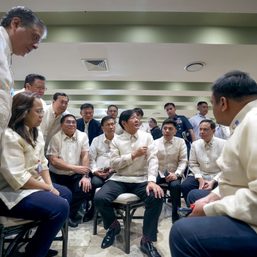SUMMARY
This is AI generated summarization, which may have errors. For context, always refer to the full article.
![[OPINION] Smart shaming at the Senate](https://www.rappler.com/tachyon/2023/09/TL-smart-shaming-senate-September-29-2023.jpg)
It was William Bagehot, a British scholar and constitutionalist, who described parliament as a “great engine of popular instruction.”
“A speech there by an eminent statesman, a party movement, by a great political combination,’”Bagehot wrote, “are the best means yet known for arousing, enlivening, and teaching a people.”
I encountered the writings of Bagehot in the bathroom library of the late senator Blas Ople. Yes, he had a library in his bathroom, or rather the narrow hallway leading to his bathroom. The office of Ka Blas at the Marbella Mansions on Roxas Boulevard had books everywhere. There were shelves of books in his work area, books on his desk, books on his writing table. He had books in the backseat of his car. I was told the mother lode was in his Bulacan home, which I never had the privilege to visit.
Ka Blas (whom I had the pleasure to work for in the Senate) was the quintessential organic intellectual, a man of humble origins who loved reading and learning. He was a lifelong student, always intrigued by new thinking, new ideas, new discoveries. But Ka Blas possessed such humility and good manners that he never showed off his intellectual heft. As a senator he never tormented government officials invited to the Senate with his intimidating mind.
I was reminded of Bagehot and Ka Blas after reading a news report about a neophyte senator supposedly humiliating a government official for explaining the difference between the organizational structures of China’s People’s Liberation Army and the Armed Forces of the Philippines. For political scientists, this is called comparative governments. In elementary school, we called it social studies. The government official was simply discussing a matter that’s part of his key competence. It’s something he was expected to know. But this senator shamed the official for being knowledgable.
Domain of the learned?
The Senate occupies a rarefied place in our political set-up. It has been regarded as the domain of learned men and women elected at large by the people. Before the declaration of Martial Law in 1972 and in the years immediately after the 1986 EDSA Revolution, the Senate was exalted for the brilliance of its senators who displayed their command of oratory, their grasp of current events, and their knowledge of history, evolving worldviews, and realpolitik.
While senators are not required to own – or read – an extensive collection of books (although that would be refreshing), they are nonetheless expected to at least have a working knowledge of how governments work, and the intricacies of executive decision-making, foreign policy, and fiscal management.
They should also be willing to listen and learn from resource persons invited to the Senate. Committee hearings, after all, are opportunities for fleshing out laws in a venue that allows a frank but civil exchange of views. Hearings are learning opportunities.
Intellectual vacuity
But lately, some senators have been reported as berating government officials for giving an answer not to their liking, contradicting their views, or even attempting to fill a considerable gap in a legislator’s stock of knowledge. Shaming government officials has become fashionable.
And the government official who is the subject of senatorial scorn is reduced to suffering in silence because resource persons are not supposed to argue with senators, even if these solons are making fools of themselves.
Of course, dramatic outbursts and displays of outsized egos have occurred in the past. Grandstanding is a tradition as old as Congress and Juan Ponce Enrile. But they were the exception more than the rule. And you have to hand it to the old guards of the Senate. They can hold the gallery in thrall with their staggering brilliance.
What we have been seeing lately, however, are flagrant and painful displays of intellectual vacuity. This goes hand in hand with finger wagging and choice insults hurled in the direction of government officials.
The powers of the Senate have been abused before. More recently, these powers were employed for political ends, to vilify personalities and institutions. And the perpetrators of these demolition jobs were driven by ambition and opportunism rather than sense of duty.
I’m certain Bagehot and Ka Blas would disapprove of this conduct.
“Ibang-iba na ngayon,” one government official, who has been in government for some time and has seen his share of Senate hearings, told me recently. It seems it doesn’t pay to be smart, or act smart, in front of some senators these days. – Rappler.com
Joey Salgado is a former journalist, and a government and political communications practitioner. He served as spokesperson for former Vice President Jejomar Binay.
1 comment
How does this make you feel?
![[OPINION] John Lennon, the West Philippine Sea, and Atin Ito](https://www.rappler.com/tachyon/2024/05/john-lennon-imagine-wps.jpg?resize=257%2C257&crop=284px%2C0px%2C720px%2C720px)


![[OPINION] Red-tagging is so yesterday. Welcome to the era of Liza-tagging](https://www.rappler.com/tachyon/2024/05/tl-liza-tagging-05022024.jpg?resize=257%2C257&crop_strategy=attention)

Thanks to Joey Salgado for his enlightening article entitled, “Smart shaming at the Senate.” He has brought up that “some senators have been reported as berating government officials for giving an answer not to their liking, contradicting their views, or even attempting to fill a considerable gap in a legislator’s stock of knowledge. Shaming government officials has become fashionable.” This is a harsh reality in the Upper Chamber of our Legislature today. These acts are committed by some of those who came from the showbusiness and social media industries. In addition, the government official “who is the subject of senatorial scorn is reduced to suffering in silence.” But sadly, the “bobotantes” will always be on the side of these “Senatorial Bullies” but there are still a few who both empathize and sympathize with the victim government officials. At least every Senate session is recorded, not only in writing but through video technology and uploaded in different social media platforms. The victimized government official should stand firm and in accordance with the Truth that he learned from his teachers, school and eventually Profession. Falsehood may win at the moment, but remember Socrates, who stood his ground, and the record will bear that he stood for the Truth during his Trial in 399 B.C. This is because, even after more than two millennia – we still have his trial’s record, although in written medium only, which we can review and reflect upon.